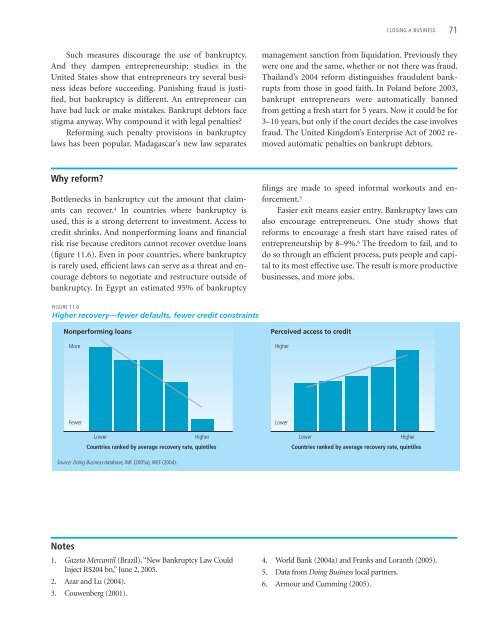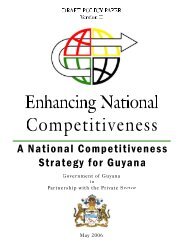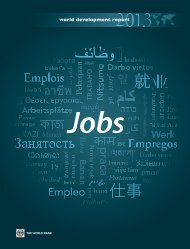Creating
Doing Business in 2006 -- Creating Jobs - Caribbean Elections
Doing Business in 2006 -- Creating Jobs - Caribbean Elections
Create successful ePaper yourself
Turn your PDF publications into a flip-book with our unique Google optimized e-Paper software.
CLOSING A BUSINESS 71<br />
Such measures discourage the use of bankruptcy.<br />
And they dampen entrepreneurship: studies in the<br />
United States show that entrepreneurs try several business<br />
ideas before succeeding. Punishing fraud is justified,<br />
but bankruptcy is different. An entrepreneur can<br />
have bad luck or make mistakes. Bankrupt debtors face<br />
stigma anyway. Why compound it with legal penalties?<br />
Reforming such penalty provisions in bankruptcy<br />
laws has been popular. Madagascar’s new law separates<br />
management sanction from liquidation. Previously they<br />
were one and the same, whether or not there was fraud.<br />
Thailand’s 2004 reform distinguishes fraudulent bankrupts<br />
from those in good faith. In Poland before 2003,<br />
bankrupt entrepreneurs were automatically banned<br />
from getting a fresh start for 5 years. Now it could be for<br />
3–10 years, but only if the court decides the case involves<br />
fraud. The United Kingdom’s Enterprise Act of 2002 removed<br />
automatic penalties on bankrupt debtors.<br />
Why reform?<br />
Bottlenecks in bankruptcy cut the amount that claimants<br />
can recover. 4 In countries where bankruptcy is<br />
used, this is a strong deterrent to investment. Access to<br />
credit shrinks. And nonperforming loans and financial<br />
risk rise because creditors cannot recover overdue loans<br />
(figure 11.6). Even in poor countries, where bankruptcy<br />
is rarely used, efficient laws can serve as a threat and encourage<br />
debtors to negotiate and restructure outside of<br />
bankruptcy. In Egypt an estimated 95% of bankruptcy<br />
filings are made to speed informal workouts and enforcement.<br />
5<br />
Easier exit means easier entry. Bankruptcy laws can<br />
also encourage entrepreneurs. One study shows that<br />
reforms to encourage a fresh start have raised rates of<br />
entrepreneurship by 8–9%. 6 The freedom to fail, and to<br />
do so through an efficient process, puts people and capital<br />
to its most effective use. The result is more productive<br />
businesses, and more jobs.<br />
<br />
<br />
<br />
<br />
<br />
<br />
<br />
<br />
<br />
<br />
<br />
<br />
Notes<br />
1. Gazeta Mercantil (Brazil), “New Bankruptcy Law Could<br />
Inject R$204 bn,” June 2, 2005.<br />
2. Azar and Lu (2004).<br />
3. Couwenberg (2001).<br />
4. World Bank (2004a) and Franks and Loranth (2005).<br />
5. Data from Doing Business local partners.<br />
6. Armour and Cumming (2005).

















